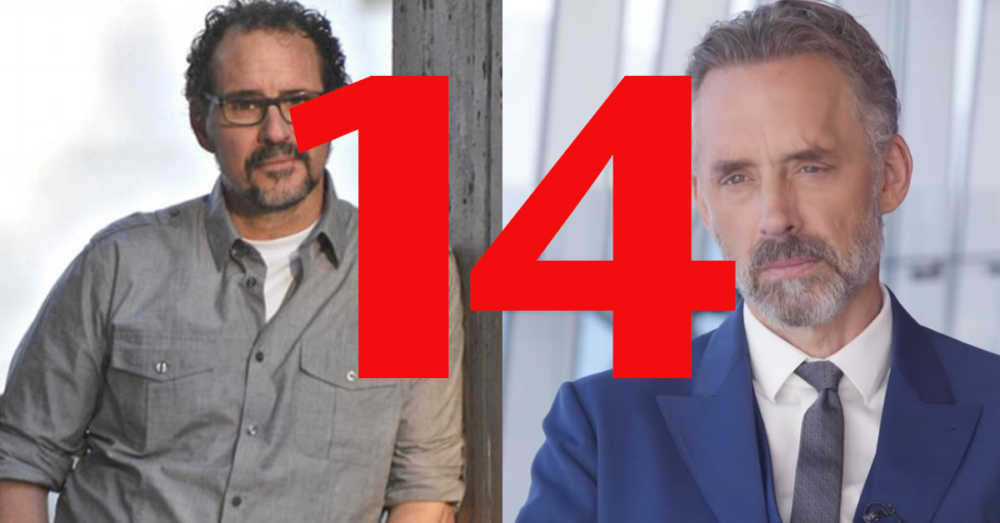We run our website the way we wished the whole internet worked: we provide high quality original content with no ads. We are funded solely by your direct support. Please consider supporting this project.

Part 14 (of 15) —Taking Responsibility (Part B)
Assessing Jordan Peterson’s 12 Rules of Life
“If things are not going well for you – well, that might be because,
as the most cynical of aphorisms has it, life sucks, and then you die.
Before your crisis impels you to that hideous conclusion, however,
you might consider the following:
life doesn’t have the problem – you do.”
Jordan Peterson
In the previous post I outlined Peterson’s thoughts on taking responsibility for our own lives, a concept that lies at the heart of Peterson’s whole philosophical and psychological outlook on life. In this post I will offer five observations about this material, the last four of which are critical of Peterson.
Be the Change You Want to See in the World
The first thing I’ll say is that, if Peterson’s advice in the previous post sounded a lot like ancient Stoicism, that is because it basically is. And that isn’t meant as a criticism, for on ethical matters, I think ancient Stoics were very insightful. (Their deterministic metaphysics, however, is another matter!). I particularly appreciate Peterson’s (and ancient Stoicism’s) emphasis on fixing yourself before you try to fix the world, for when broken people try to fix the world, they most often end up further breaking it. As Gandhi famously put it, the best thing anyone can do for the world is to simply “be the change [they] want to see in the world.”
This is advice I wish more American Christians would take seriously, both at an individual and ecclesial level. Instead of trying to “take America back for God” by positioning ourselves as Caesar’s wise advisers who assume we know better and care more than others about issues that divide the polis, we ought to make it our highest aspiration to simply be who God has called and empowered us to be; namely, individuals and communities that imitate God by living “in love as Christ loved us and gave his life for us” (Eph 5:1-2). I’m personally convinced that if Christians stopped trying to fix the world by grabbing hold of political power and simply focused on demonstrating God’s love in practical ways to all people, and especially to people in need, the transforming effect we would have on society would dwarf in significance whatever positive changes political regimes can occasionally manage to bring about.
Identity Politics and the Legitimate Rebellion Against Tyranny
Second, while I will qualify this in a moment, I think there is wisdom in Peterson’s advice to avoid blaming one’s misery on others and becoming resentful as a result. Generally speaking, I think it wise to heed Peterson’s advice to first question what we may have done to contribute to our own misery and how we might alleviate our suffering by adopting a different attitude, differing values and different behaviors. And I think there is great wisdom in Peterson’s counsel to avoid falling into resentment at all costs. I have personally seen resentment and the victimization mindset that accompanies it destroy people. It is cancer to the soul.
Having said that, however, I’m not sure Peterson is entirely consistent on this point. For example, he claims:
…resentment always means one of two things. Either the resentful person is immature, in which case he or she should shut up, quit whining, and get on with it, or there is tyranny afoot—in which case the person subjugated has a moral obligation to speak up (91).
So, when “there is tyranny afoot,” one has “a moral obligation” to speak out against it. Got it. But isn’t this exactly what marginalized and oppressed people-groups are doing when they decry the racist, sexist, or otherwise discriminatory aspects of society that subjugate their rights and freedoms and suppress their individuality? Yet, when these oppressed and marginalized folks speak out against the “tyranny” they believe they are suffering under, Peterson claims they are playing “identity politics.”
Based on various videos I’ve viewed, I suspect Peterson would respond by arguing that he doesn’t oppose individuals speaking out against their own oppression, he merely opposes people forming political action groups based on a perceived shared oppression. For while individuals can be reasoned with and can reexamine their lives to see how they can change things to alleviate their suffering, once people acquire a political group identity, they are no longer focused on setting their own house in order and are instead focused on reorganizing society in way that solves their problem. Indeed, when one identifies with a political action group, all of an individual’s needs that lie outside their group identity get set aside as irrelevant to the collectivist thinking of the group. They are in effect reduced to the agenda set by the group and are strapped with a victim mindset that blames society for their problems.
While I find Peterson to be insightful on the power-dynamics of collectivist thinking, I find his thinking on “identity politics” to be a bit muddled. Suppose you are a gay man who feels your gayness disadvantages and oppresses you in western society. Peterson grants that you have the right – indeed, the “moral obligation” — to speak out against this tyrannical aspect of the culture. But what would Peterson have you do when you find out there are many others who also are speaking out about the oppression of gay people? The fact of the matter is that you already are part of a group that politically identifies themselves as victims of homophobic aspects of western culture.. And you already are part of a chorus of voices that are trying to rid western culture of this form of tyranny. The official “political identity” this group gives itself simply acknowledges this fact.
So, I’m left wondering what Peterson would have you do, especially since the only way to end any systemic “tyranny that is afoot” is for masses of people to speak out against it as a unified group? I am empathetic with Peterson’s concerns about “identity politics,” but if his call to end “identity politics” is to be plausible, I think he needs to offer an alternative to those individuals who heed his advice to speak out against tyranny.
I am also left wondering about what Peterson would think about the many Russians who joined Aleksandr Solzhenitsyn in speaking out against the tyranny of Russia’s Communistic policies. I doubt very much that he would criticize them for playing “identity politics.” To the contrary, Peterson celebrates the impact that Solzhenitsyn’s book, The Gulag Archipelago, had on dismantling the Communist regime. But this book only had this impact because it inspired others to join his anti-Communist revolt.
The question is: How is what these Russians were doing different, in principle, from (say) what the LGBT+ crowd is doing in western culture? If Peterson sees a difference in principle in what these two groups are doing, I would think it would be important for him to clearly spell this out. So far as I’ve been able to discern, he has never done this.
Lacking this distinction, one is tempted to wonder if Peterson legitimizes the group revolt against the tyranny of Communism but not the “identity politics” of groups revolting against western culture’s oppression of (say) LGBT+ people simply because Peterson firmly believes that Communism oppresses people but doesn’t believe that western culture oppresses LGBT+ people. If this is true, I would simply point out that the only way a straight white male like Peterson or myself could learn if western culture actually oppresses LGBT+ people would be by developing trusting relationships with people who identity as LGBT+ and empathetically listening to their stories. But I’m not sure how many trusting relationships Peterson could hope to enter into with LGBT+ people so long as he continues to accuse them of playing “identity politics.”
Blaming the Victim
Third, I think Peterson is by and large correct when he states that “the world is revealed…through the template of your values” (170) and, therefore, that the world reveals “whatever goodness it contains in precise proportion to your desire for the best” (101). To a large degree, you find in life what you’re looking for, for better or for worse. Hence, people who embrace a victim mindset will likely see what they believe to be misery-creating oppression at every turn. This, in fact, is one of the unfortunate consequences of people playing “identity politics,” according to Peterson.
What concerns me, however, is that Peterson often speaks as though there was nothing else that could factor into one’s misery. As we saw in the previous post, the first step in taking responsibility for our life is to consider the possibility that “life doesn’t have the problem. You do” (99). And, as we saw back in post 8, Peterson goes so far as to claim that “[t]he degree to which the terrible part of the world manifests itself in your life is proportionate to how insufficient you are.” He thus suggests that “[i]f you got your act together completely, maybe all the suffering would disappear from your life, or at least all the unbearable suffering.”1
It almost sounds like Peterson is saying that we should assume that all of a person’s misery, or at least all of their “unbearable” misery, is their own fault. However, one could argue that Peterson is speaking hyperbolically in these contexts and that he is actually simply restating, in very emphatic terms, the need for individuals to start their attempts to alleviate their suffering by examining themselves and putting their own house in order instead of trying to solve their problems with a social revolution.2 Even if so, however, I am concerned about how such hyperbolic advice might be heard by (say) a young person who recently woke up from a coma only to discover their skiing accident has left them paralyzed from the neck down, or a mother who just lost her daughter to cancer, or a parent of three children who is stuck in the perpetual limbo of a dehumanizing Refugee camp.
Sometimes one’s misery is so obviously about life and not about them that it would be absurd and callous to even suggest to them the possibility that “life doesn’t have the problem. You do.”
Having Compassion
Fourth, and closely related to this, I’m concerned what this strongly emphasized teaching of Peterson might do to people’s willingness to have compassion on others. Because Peterson wants us to suspect that our unbearable suffering is our own fault, he doesn’t put a premium on exercising compassion toward sufferers. Indeed, when Peterson speaks about compassion in 12 Rules of Life, it is almost always to call its authenticity and helpfulness into question. He frequently questions the motives of both the one being helped and the one doing the helping.
For example, Peterson says that a person who repeatedly tries and fails to improve their life or circumstances is “too often the person who wants everyone to believe in the authenticity of all that trying” (76). And “[w]hen it’s not just naivete,” Peterson writes, “the attempt to rescue someone is often fueled by vanity and narcissism” (76). Similarly, Peterson writes:
Maybe you are saving someone because you’re a strong, generous, well-put-together person who wants to do the right thing. But it’s also possible – and, perhaps, more likely – that you just want to draw attention to your inexhaustible reserves of compassion and good-will. Or maybe you’re saving someone because you want to convince yourself that the strength of your character is more than just a side effect of your luck and birthplace. Or maybe it’s because it’s easier to look virtuous when standing alongside someone utterly irresponsible (79).
It is of course good to examine our motives for engaging in acts of compassion, and there are certainly contexts in which it is useful to question the motives of the person you’re considering helping. We certainly don’t want to be enablers who have ulterior motives for engaging into compassionate-looking behavior. On the other hand, since we often have trouble ascertaining our true motives, let alone the motives of others, making the suspicion of ulterior motives our default setting could easily keep us in a state of perpetual paralysis when it comes to acting compassionately. How can you really know your motives or the motives of the person you are considering helping are pure?
I submit that this suspicion should not be the default setting for followers of Jesus.
It surely is significant that the Gospels tell us that Jesus routinely had compassion toward the crowds who gathered around him, and there is no indication that Jesus investigated people’s motives before having compassion on people (Matt 9:36; 14:14; 15:32; 20:34). Indeed, Jesus spent his entire three-year ministry showing compassion to suffering people and working to alleviate their misery. Yet, with only one possible exception (Jn 5:14), Jesus never suggested that a person’s suffering was their own fault.3 And even in the one instance in which Jesus suggested a person’s sin might have something to do with their affliction, he nevertheless demonstrated compassion toward the man by healing him.
So too, Jesus taught that when we provide food, clothing, or shelter to people in need, we are providing these things to him, and he teaches this without any consideration of why these people are in need in the first place. Indeed, Jesus said the same thing about befriending a person in prison — a person who presumably is responsible for bringing their suffering (their imprisonment) on themselves (Matt 25:33-45).
Of course, Jesus wisely discerned that there are times when confrontation rather than compassion is what love calls for. For example, he spoke harshly with the Jewish authorities because he knew that only this sort of shocking rhetoric held out any hope of cracking their hardened, self-righteous hearts (Matt 23). The same holds true when Jesus turned over tables and caused an animal stampede in the Temple (John 2:13-17). As was true of Jesus, there are situations in which Jesus-followers are called to exercise “tough love.”
Still, whenever people asked Jesus for help, Jesus gave it. And in this light, I submit that, even in cases in which it is clear that a suffering person is responsible for their own suffering, this should not condition our compassion toward them or our desire to do whatever we can do to alleviate their suffering. Obviously, this compassion doesn’t mean that we always give people whatever they want from us, for it could very well be that what they want is something that’s contributing to their misery (e.g. drugs). But the motive Jesus-followers should have for showing compassion to others, whatever form it takes, has nothing to do with the merits or authenticity of the people we aim at helping. Our motivation should rather be based solely on that fact that we are children of the Father who are called and empowered to love like the Father loves — indiscriminately and unconditionally, like the rain falls and the sun shines. Hence, we are even called to love and show compassion to life-threatening enemies (Matt 5:44-45; Luke 6:27-36).
Save Yourself
Finally, and most importantly, the most fundamental axiom in Peterson’s outlook, so far as I can discern, is that every individual ultimately has to save themselves. You must simply resolve to improve yourself and then “tie a rope to a boulder, [p]ick up the great stone, heave it in front of you, and pull yourself towards it” (224). Just do it! 12 Rules of Life as well as many videos are saturated with self-help instructions such as this.
I consider this to be the most anti-Christian aspect of Peterson’s thought. While the New Testament (NT) presupposes that it is up to each individual to freely chose to place their trust in Christ and to walk in the way of Christ, and while the NT also emphasizes the need for Jesus-followers to “work out [their] salvation with fear and trembling,” it also emphasizes, over and over, that we can only do this because “it is God who works in you to will and to act in order to fulfill his good purposes” (Phil 2:12-13). Indeed, we are taught that, apart from Christ, we are “dead in sin” (Eph 2:1, 5). We could not even have faith in Christ were it not given to us as a gift, out of God’s sheer grace, and were it not for the rejuvenating work of the Holy Spirit in our hearts (Eph 2:8, cf. 1 Cor 12:3).
Along similar lines, while Peterson frequently speaks of our need to make sacrifices to “atone” for our sin (e.g. 200), the NT teaches that we needed the sacrifice of the Savior to atone for our sin. (In the following post I will demonstrate the way in which Peterson transforms Jesus into an archetype of the kind of heroic self-sacrifice we all need to make).
I don’t fault Peterson for contradicting the Christian faith so profoundly at this point, for as we’ll see in a subsequent post, Peterson is not a Christian, or even a theist, in any historic-orthodox sense of the word. Moreover, while Peterson draws heavily from the Bible, he writes and speaks to a diverse audience and thus does not presuppose any particular faith perspective. For this reason, the only thing Peterson has to leverage to get people to begin to improve their lives is their own self-determination. Nevertheless, while Jesus-followers certainly need to be encouraged to strive to improve themselves (which means, to become more Christlike), we must always remember that we could not begin to take a step in this direction were it not for the unmerited grace of God and the empowerment of his indwelling Spirit.
It is the awareness of our dependency on God more than anything else that sets the Christian faith apart from all save-yourself philosophies, including Peterson’s.
___ ___ ___
2 Thanks to Cory Wright who proposed this interpretation to me and has provided very helpful feedback on all my posts.
3 Some think that John 9:1-3 also constitutes an exception to Jesus’ usual pattern, but I argue that it does not. See https://whchurch.org/sermon/fog-of-war/ .
Category: General
Tags: Book Reviews, Books, Jordan Peterson
Related Reading

Part 4: An Alternative Cross-Centered Approach
Image by Karl Pang via Flickr As I mentioned in Part II of this review, I am deeply appreciative of the fact that Flood grasps the centrality of enemy-loving non-violence in Jesus’ revelation of God. And while many, if not most, of the depictions of Yahweh in the Old Testament are consistent with this revelation, I…

Is God to Blame Endorsements and Reviews
Endorsements: “In this stimulating work, Gregory Boyd shows how an incarnational theology focuses on God’s action in Jesus Christ as the source for our knowledge of God. In Jesus we see what God does for us, how God loves us, how God feels for us and how God rescues creatures and creation. This work restores…

What Have You Been Reading Lately? (podcast)
Does God suffer? Should we learn to swim? Drumming, books, magazines and more! Episode 586 http://traffic.libsyn.com/askgregboyd/Episode_0586.mp3

Part 6 (of 15): Evolutionary Conservatism
Assessing Jordan Peterson’s 12 Rules for Life by Greg Boyd “If reality is that which selects, then what’s selected by that reality must in some sense be correct.” Evolutionary Wisdom As was true of Heraclitus and Lao Tzu, and as a number of domains of contemporary science have demonstrated over the last century, Peterson believes…

Satan and the Problem of Evil Endorsements
Endorsements: “Greg Boyd has shown us that the most powerful way to view God in a postmodern world is through the eyes of the warfare worldview of Scripture. This biblical argument not only makes sense of our ravaged world, it turns us to the only hope we have–a world whose end is in the hand…

Podcast: The Making of Crucifixion of the Warrior God with Tony Jones
Dan and Tony talk about Greg’s books Crucifixion of the Warrior God and Cross Vision. Tony reveals what it was like to work with Greg, what the publishing industry is like right now, and what prospective authors can do to publish their own book. Tony’s recent book is available here: Did God Kill Jesus http://traffic.libsyn.com/askgregboyd/Episode_0423b.mp3…
